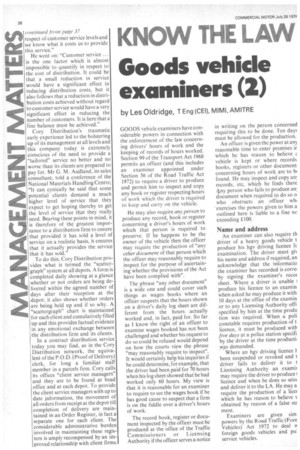< A
Page 44

If you've noticed an error in this article please click here to report it so we can fix it.
Goods vehicle examiners (2)
by Les Oldridge, T Eng (CEO, MIMI, AMITRE GOODS vehicle examiners have considerable powers in connection with the enforcement of the law concerning drivers' hours of work and the keeping of records of hours worked. Section 99 of the Transport Act 1968 permits an officer (and this includes an examiner appointed under Section 56 of the Road Traffic Act 1972) to require a driver to produce and permit him to inspect and copy any book or register respecting hours of work which the driver is required to keep and carry on the vehicle.
He may also require any person to produce any record, book or register concerning a driver's hours of work which that person is required to preserve. If he happens to be the owner of the vehicle then the officer may require the production of "any other document of that person which the officer may reasonably require to inspect for the purpose of ascertaining whether the provisions of the Act have been complied with".
The phrase "any other document" is a wide one and could cover such things as wages books where an officer suspects that the hours shown on a driver's daily log sheet are different from the hours actually worked and, in fact, paid for. So far as I know the right of an officer to examine wages booked has not been challenged and whether his request to do so could be refused would depend on how the courts view the phrase "may reasonably require to inspect". It would certainly help his inquiries if he could determine, for example, that the driver had been paid for 70 hours when his log sheet showed that he had worked only 60 hours. My view is that it is reasonable for an examiner to require to see the wages book if he has good cause to suspect that a firm is on the fiddle over a driver's hours of work.
The record hook, register or document inspected by the officer must be produced at the office of the Traffic Commissioners or Licensing Authority if the officer serves a notice in writing on the person concerned requiring this to be done. Ten day must be allowed for the production.
An officer is given the power at an) reasonable time to enter premises ir which he has reason to believe vehicle is kept or where records books, registers or other document, concerning hours of work are to ly found. He may inspect and copy an: records, etc, which he finds there 4ny person who fails to produce an: document when required to do so o who obstructs an officer wh■ 'exercises the powers given to him a outlined here is liable to a fine nc exceeding £100.
Name and address
An examiner can also require th driver of a heavy goods vehicle t produce his hgv driving licence fc examination. The driver must gh his name and address if required, an acknowledge that the informatio the examiner has recorded is carrel by signing the examiner's rem sheet. Where a driver is unable produce his licence to an examin when asked he may produce it with 10 days at the office of the examin or to any Licensing Authority offi specified by him at the time produ tion was required. When a poli constable requires production of t licence, it must be produced with Jive days at a police station specifi by the driver at the time producti, was demanded.
Where an hgv driving licence I been suspended or revoked and 1 driver fails to deliver it to I Licensing Authority an examii may require the driver to produce I licence and when he does so seizA and deliver it to the LA. He may a require the production of a licei which he has reason to believe N obtained by reason of a false ste ment, Examiners are given sim powers by the Road Traffic (Fore Vehicles) Act 1972 to deal v foreign goods vehicles and pu service vehicles.
































































































